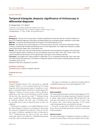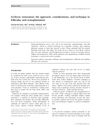 44 citations,
January 2002 in “American Journal of Clinical Dermatology”
44 citations,
January 2002 in “American Journal of Clinical Dermatology” Skin reactions to antidepressants are common but usually not serious and can be treated.
 41 citations,
April 2010 in “Gender Medicine”
41 citations,
April 2010 in “Gender Medicine” The conclusion is that hirsutism should be diagnosed and treated because it affects quality of life and may signal other health problems.
 35 citations,
April 2006 in “Ocular Surface”
35 citations,
April 2006 in “Ocular Surface” Cosmetics and procedures can cause eye issues, from mild discomfort to serious conditions, due to allergies, toxins, or poor care.
34 citations,
July 2020 in “American journal of human genetics” Changes in the SREBF1 gene cause a rare genetic skin and hair disorder.
 32 citations,
December 2018 in “Cytokine”
32 citations,
December 2018 in “Cytokine” Type I interferons play a key role in the development of various skin diseases.
 31 citations,
July 2015 in “Clinical, Cosmetic and Investigational Dermatology”
31 citations,
July 2015 in “Clinical, Cosmetic and Investigational Dermatology” Hair restoration surgery effectively treats hair loss with natural-looking results, using techniques like stem cells and platelet-rich plasma.
 30 citations,
July 2019 in “Endocrinology”
30 citations,
July 2019 in “Endocrinology” Certain HSD3B1 gene types are linked to worse prostate cancer outcomes and affect treatment response and other health conditions.
 26 citations,
August 2018 in “American Journal of Clinical Dermatology”
26 citations,
August 2018 in “American Journal of Clinical Dermatology” Hair loss in cancer patients can be related to the cancer itself, treatment, or other conditions, and understanding it is important for diagnosis and patient care.
26 citations,
August 2008 in “Clinical endocrinology” The document concludes that more multidisciplinary research is needed to understand and treat PCOS, a condition that significantly affects women's health and quality of life.
 25 citations,
June 2019 in “Endocrine Related Cancer”
25 citations,
June 2019 in “Endocrine Related Cancer” Mutations in certain receptors can cause diseases and offer new treatment options.
 25 citations,
July 2014 in “Hong Kong medical journal”
25 citations,
July 2014 in “Hong Kong medical journal” Some skin disorders might be linked to H. pylori infection, but more research is needed to confirm this.
 25 citations,
January 2009 in “Oral and Maxillofacial Surgery Clinics of North America”
25 citations,
January 2009 in “Oral and Maxillofacial Surgery Clinics of North America” Successful hair transplant surgery depends on careful patient selection, proper surgical plan and technique, and attentive aftercare.
 24 citations,
September 2014 in “Journal of the European Academy of Dermatology and Venereology”
24 citations,
September 2014 in “Journal of the European Academy of Dermatology and Venereology” Trichoscopy is reliable for diagnosing Temporal Triangular Alopecia and can prevent unnecessary biopsies and wrong treatments.
 23 citations,
April 2018 in “Journal der Deutschen Dermatologischen Gesellschaft”
23 citations,
April 2018 in “Journal der Deutschen Dermatologischen Gesellschaft” Permanent hair loss from cicatricial alopecia is treated by reducing inflammation and managing symptoms, but regrowth in scarred areas is unlikely.
 20 citations,
July 2008 in “Dermatologic Therapy”
20 citations,
July 2008 in “Dermatologic Therapy” The document says that treating the root cause of hair follicle damage is crucial to prevent permanent hair loss, and treatment options vary.
 19 citations,
February 2018 in “Nutrients”
19 citations,
February 2018 in “Nutrients” Certain zinc transporters are essential for healthy skin and managing zinc in the body could help treat skin problems.
 18 citations,
January 1999 in “CNS Drugs”
18 citations,
January 1999 in “CNS Drugs” Some anticonvulsant drugs can cause skin reactions, ranging from mild to severe, and managing these reactions is important for patient care.
 15 citations,
September 2018 in “Medicine”
15 citations,
September 2018 in “Medicine” Childhood ptosis can vary from a minor cosmetic issue to a serious condition and may signal other health problems.
13 citations,
January 2018 in “Yonsei Medical Journal” A specific gene mutation causes Olmsted syndrome.
 12 citations,
June 2003 in “Journal of the European Academy of Dermatology and Venereology”
12 citations,
June 2003 in “Journal of the European Academy of Dermatology and Venereology” Some psychoactive drugs can cause skin reactions, with carbamazepine having a higher risk, and stopping the drug and seeing a dermatologist is important.
11 citations,
September 2021 in “American Journal of Medical Genetics Part A” Four new cases of Bachmann-Bupp syndrome suggest potential for targeted treatment.
11 citations,
December 2017 in “Orphanet Journal of Rare Diseases” A new mutation in the ST14 gene broadens the understanding of ichthyosis-hypotrichosis syndrome.
 11 citations,
June 2011 in “Expert Review of Dermatology”
11 citations,
June 2011 in “Expert Review of Dermatology” Skin reactions to drugs are common and can be deadly, usually requiring stopping the drug and may be better prevented with genetic testing in the future.
 11 citations,
May 2003 in “Obstetrics and gynecology (New York. 1953. Online)/Obstetrics and gynecology”
11 citations,
May 2003 in “Obstetrics and gynecology (New York. 1953. Online)/Obstetrics and gynecology” Hirsutism in women often indicates a hormonal imbalance and can be managed with a combination of hormonal treatments and hair removal methods.
 10 citations,
August 2015 in “Journal of Cosmetic Dermatology”
10 citations,
August 2015 in “Journal of Cosmetic Dermatology” Successful eyebrow restoration can be done using careful hair transplant techniques and choosing the right patients.
9 citations,
May 2014 in “BMC medical genetics” A woman with a unique syndrome similar to TRPS has a genetic change near the TRPS1 gene, affecting its regulation.
 7 citations,
June 2015 in “Cutaneous and Ocular Toxicology”
7 citations,
June 2015 in “Cutaneous and Ocular Toxicology” Some drugs can cause skin reactions, which may improve when the drug is stopped, and rapid diagnosis and stopping the drug is crucial.
 7 citations,
December 2008 in “Expert Review of Dermatology”
7 citations,
December 2008 in “Expert Review of Dermatology” The document concludes that various childhood hair and nail disorders exist, some may improve on their own, and advances in genetics and immunology could enhance treatment and counseling.
6 citations,
January 2023 in “Evidence-based Complementary and Alternative Medicine” Combining yoga and certain herbs can effectively manage PCOS symptoms and improve quality of life.
 6 citations,
November 2021 in “Frontiers in immunology”
6 citations,
November 2021 in “Frontiers in immunology” STAT3 signaling is important for healthy skin and hair follicles, and its disruption can lead to skin conditions like atopic dermatitis.























